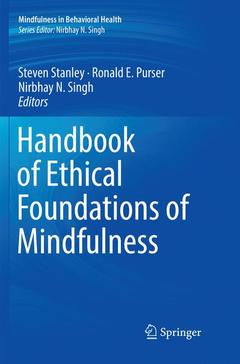Handbook of Ethical Foundations of Mindfulness, 1st ed. 2018 Mindfulness in Behavioral Health Series
Coordonnateurs : Stanley Steven, Purser Ronald E., Singh Nirbhay N.

This handbook explores the multifaceted ethical dimensions of mindfulness, from early Buddhist sources to present-day Western interpretations of mindfulness. It takes a modern ethical approach to the study of mindfulness, and traces contemporary mindfulness practice from solitary journey to the global whole. Noted practitioners, teachers, scholars, and other professionals lend diverse perspectives to the debate over the moral content of mindfulness and its status as religious, secular, or post-secular practice. Chapters offer new views on the roots of mindfulness in Buddhist moral teachings, ethical mindfulness in interpersonal relationships, and the necessity of ethics in mindfulness-based education and therapy. Chapters also discuss current debates concerning the ethics of mindfulness across the applied fields of education and pedagogy, business, economics, and the environment.
Topics featured in this handbook include:
· Mindfulness as the true foundation of a naturally ethical life.
· Mindfulness and its impact on emotional life, interpersonal relationships, and forgiveness.
· How Buddhist ethics informs spiritual practice across the three main vehicles (yanas) of Buddhism and its relation to mindfulness.
· ?McMindfulness?, or the mass marketization and commodification of mindfulness-based interventions (MBIs).
· How an ethic of interdependence formed by Buddhist principles and mindfulness practices can help address the environmental crisis.
The Handbook of Ethical Foundations of Mindfulness is a must-have resource for researchers, clinicians/professionals, and graduate students in psychology, complementary and alternative medicine, and social work as well as occupational and rehabilitation therapy, nursing, philosophy, business management, and teachers of Buddhism and meditation.
Steven Stanley, Ph.D. is a Lecturer in the School of Social Sciences at Cardiff University (Wales, UK). A critical psychologist interested in the qualitative study of social life in capitalism, he has investigated historical changes in meanings of mindfulness and meditation, ethics and politics of the mindfulness movement, and mindfulness meditation as a psychosocial research methodology. His articles have appeared in journals such as Theory & Psychology, Qualitative Research in Psychology and New Ideas in Psychology. His current research comprises discourse analysis of interaction in mindfulness courses and is titled, Constructing the mindful subject: reshaping experience through Mindfulness-Based Stress Reduction. Steven also teaches mindfulness as contemplative education and critical inquiry to sociology, social psychology, education, and social work students. He completed the Committed Dharma Practitioner Programme (Gaia House, Devon, UK) and Pali Summer School (Oxford Centre for Buddhist Studies, Oxford, UK).
Ronald Purser, Ph.D. is a professor of management at San Francisco State University. He is co-author of five books including, 24/7: Time and Temporality in the Network Society (Stanford University Press, 2007), and over 60 academic journal articles and book chapters. More recently, Professor Purser’s writings critically examine Buddhism’s encounter with modernity, capitalism and individualism, particularly in corporate settings. Dr. Purser began his Buddhist training beginning in 1981 at the Tibetan Nyingma Institute in Berkeley. In 1985, he was a student at the Cleveland Zen Center under Koshin Ogui Sensei who had been Shunryu Suzuki’s personal assistant in the early 1960’s. He has studied with numerous Zen teachers and Tibetan lamas, is now an ordained Dharma instructor in the Korean Zen Buddhist Taego order. His recent articles include White Privilege and the Mindfulness Movemen
Examines the multifaceted ethical dimensions in early Buddhist thought and contemporary mindfulness training
Reviews the Buddha's teachings on medication practices and how these may inform mindfulness-based interventions
Describes mindfulness training and practices in schools, hospitals, businesses, prisons, and the community
Explores ways in which mindfulness may be influenced by the integration of compassion practices
Date de parution : 01-2019
Ouvrage de 363 p.
15.5x23.5 cm
Date de parution : 08-2018
Ouvrage de 363 p.
15.5x23.5 cm
Disponible chez l'éditeur (délai d'approvisionnement : 15 jours).
Prix indicatif 295,39 €
Ajouter au panierThème de Handbook of Ethical Foundations of Mindfulness :
Mots-clés :
Anglo-American Puritanism, mindfulness, and ethics, Breathing and mindfulness practice, Buddhism and ethics, Buddhist ethics and environmental crises, Capitalism and Buddhist ethics, Liberation and mindfulness, Loving kindness meditation, Mindfulness and ethics, Mindfulness, Eudaimonia and virtue ethics, Mindfulness-based cognitive therapy and ethics, Mindfulness-based interventions and ethics, Mindfulness-Based Stress Reduction and ethics, Morality and mindfulness, Pāli Texts and mindfulness, Responsibility



